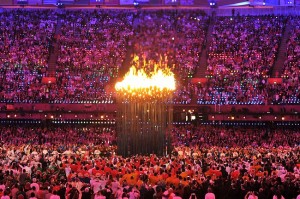
The world has been asking, these last four years: how can the London games ever hope to compete with the Beijing pageantry of 2008?
That Olympic-sized question has been answered at last, by way of a stunning three-hour opening ceremony directed by filmmaker Danny Boyle, officiated by Her Majesty Elizabeth Regina, and presented unto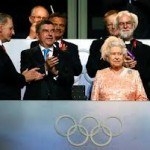 all of us by the citizens of the United Kingdom.
all of us by the citizens of the United Kingdom.
No easy task, for any of the aforementioned. These are London’s third games, and in terms of logistics and wherewithal, Great Britain might have been as vexed in 2012, in coordinating an Olympic gathering, as they were in 1908 and 1948. In their first turn at hosting, over a century ago, they had a scant two years to prepare; they graciously stepped in for Rome, which had been previously scheduled to host the games but which faced financial disaster after an eruption of Mount Vesuvius. Then, forty years later, London hosted the resumption of the Olympics after a twelve-year war-torn lull. A gracious gesture again, but a somewhat impoverished one. London was still battered from the Blitz and lacked the treasury to create an Olympics we in the twenty-first century would recognize. The world’s athletes were housed in abandoned army barracks and were asked to bring their own towels.
The 30th Olympiad of 2012, when awarded to London, was seen as an opportunity for the city on the Thames 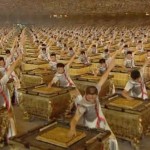 to redeem itself. But then, even as preparations moved ahead, a worldwide financial crisis stuck, and it stung Great Britain particularly badly. In the midst of that, a hyper-rich emerging superpower hosted a truly awesome Olympics, with an opening ceremony that unhinged jaws all around the world. Even as we marveled at China’s accomplishment we thought ahead to 2012 and wondered how London would respond. How could they respond?
to redeem itself. But then, even as preparations moved ahead, a worldwide financial crisis stuck, and it stung Great Britain particularly badly. In the midst of that, a hyper-rich emerging superpower hosted a truly awesome Olympics, with an opening ceremony that unhinged jaws all around the world. Even as we marveled at China’s accomplishment we thought ahead to 2012 and wondered how London would respond. How could they respond?
The answer is in, and respond they did. The British people, ever practical, didn’t try to match the unimaginable expenditure of Beijing. They did not, as London mayor Boris Johnson put it, exhaust their defense budget on pyrotechnics. They gave a good show, to be sure. It was marvelous, in fact. But it wasn’t wrought through technical wizardry or through the choreography of tens-of-thousands. It came through the opening, the sharing, of the British soul.
And that, again, couldn’t have been an easy thing to do. This is a nation that was, within living memory, an empire upon which the sun never set. But the sun did set and the empire is no more. Not every culture can survive a deceleration like that. Ends of empires bring on dark ages, in the usual course of things.
But that’s not what happened with Great Britain; and that, I think, is what they were telling us in London last night. I think they were admitting their diminished role on the world stage – admitting it to us and to themselves, for the first time, really – and insisting they’re collectively okay with that.
In place of empire some sort of British identity needed to emerge. It has struggled to emerge since that magnificent isle bankrupted itself defeating Hitler. It has struggled to emerge as it relinquished colonies and built a Commonwealth. It has emerged, but it did so subtly, over decades. From our post-modern vantage point, and with the historical clarity that events like the Olympics offer, we can at last plainly see that identity – a shock of recognition to see something we’ve really known all along.
Great Britain – England, Wales, Scotland and Northern Ireland – has become the conscience of the world and the font of our unifying global culture. It is a liberal democracy that demonstrates how a people can honor their past but break with it; how the ‘white man’s burden’ is no longer a national philosophy but rather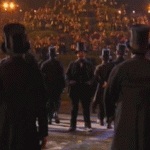 something they’ve willingly consigned to the dustbin of history. It is the voice of a people declaring an intentional, mutual maturation, even if they know that maturity comes with a price.
something they’ve willingly consigned to the dustbin of history. It is the voice of a people declaring an intentional, mutual maturation, even if they know that maturity comes with a price.
THAT is what London was telling us last night.
London knows, as well, that in the place of political preeminence, an ascendancy of a different sort has come upon the British nation: cultural ascendancy. It is popular to suppose that American culture defines our global village; but let this self-admitted maven of American culture proclaim it here and now: American culture is only an offshoot of the things our British cousins create.
There was a celebration of British culture, of the gifts of British culture, in the Olympic stadium. Some might have mistaken it for celebrity worship, which is something that Olympic revelry has always mostly lacked. 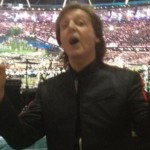 But the parade of superstars weren’t there in a self-congratulatory mode, I think.
But the parade of superstars weren’t there in a self-congratulatory mode, I think.
What they were saying, I think, is that Britain has become music and literature and the dramatic arts. Britain has always been these things, in truth; these things have always been close to the British heart. But now at last Britain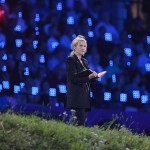 recognizes, and wants the world to recognize, that these things rank highest among all that which Britain gives.
recognizes, and wants the world to recognize, that these things rank highest among all that which Britain gives.
Beyond dispute, Britain has given much else. From Isaac Newton to Robert Stephenson, there have always been genius Britons with transformative insights. 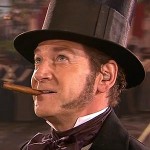 But the post-war British introspection concluded that science, technology, and transformation weren’t always without cost. The Industrial Revolution, a purely British invention, was a watershed in human history. It made possible the world in which we live. But it wasn’t a bloodless revolution, and that’s something that the British people now confess.
But the post-war British introspection concluded that science, technology, and transformation weren’t always without cost. The Industrial Revolution, a purely British invention, was a watershed in human history. It made possible the world in which we live. But it wasn’t a bloodless revolution, and that’s something that the British people now confess.
So in the dampening of that pride of place, what’s left for the UK to crow about? What else but culture can Great Britain point to and say, “This is our legacy. This is the manifestation of what we leave to the world. This is us.”
And that’s how the Olympics, or at least a part of it, glides between an ancient/modern salutation to sport, and a rollicking tribute to The Clash, to the Bard, and to Mary Poppins.
Was it silly? A bit, at times. Was it confusing, overcrowded, and overly thick with symbolism? Again, maybe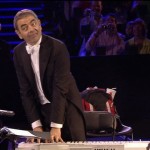 just a bit. But even in these things we can glimpse what Britain was trying to tell us. This is after all an island that happily embraces a dichotomy of stodginess and silliness, and never apologizes for it. Even in the silliness and the self-deprecation we can see the flavor of international event Britain chooses to host.
just a bit. But even in these things we can glimpse what Britain was trying to tell us. This is after all an island that happily embraces a dichotomy of stodginess and silliness, and never apologizes for it. Even in the silliness and the self-deprecation we can see the flavor of international event Britain chooses to host.
There came a point when symbolism and self-identification were graciously set aside, and Olympic tradition resumed. The athletes presented themselves in the Parade of Nations, the cauldron was lit, the Games declared open. For the next sixteen days these Olympic games become less about Britain, more about the ideals of competition, sportsmanship, and maybe even world peace.
How those ideals emerge remains to be seen. It’s a violent world and the games have been targeted before. Anti-aircraft weapons mar the rooftops of London’s East End. We fervently hope for an Olympics free of tragedy and remarkable only for world records and athletic feats. We can’t know at this point how those hopes will be met.
But we do know that the 2012 Olympics have begun in an awe-inspiring, unforgettable way. We know that the people of Great Britain have shown us things about themselves we’ve only suspected until now. We know that a new British identity has been established, affirmed, and heralded. And we know we’ll be talking about that Opening Ceremony for years to come.
Thank you for the show, London. It was one for the ages.